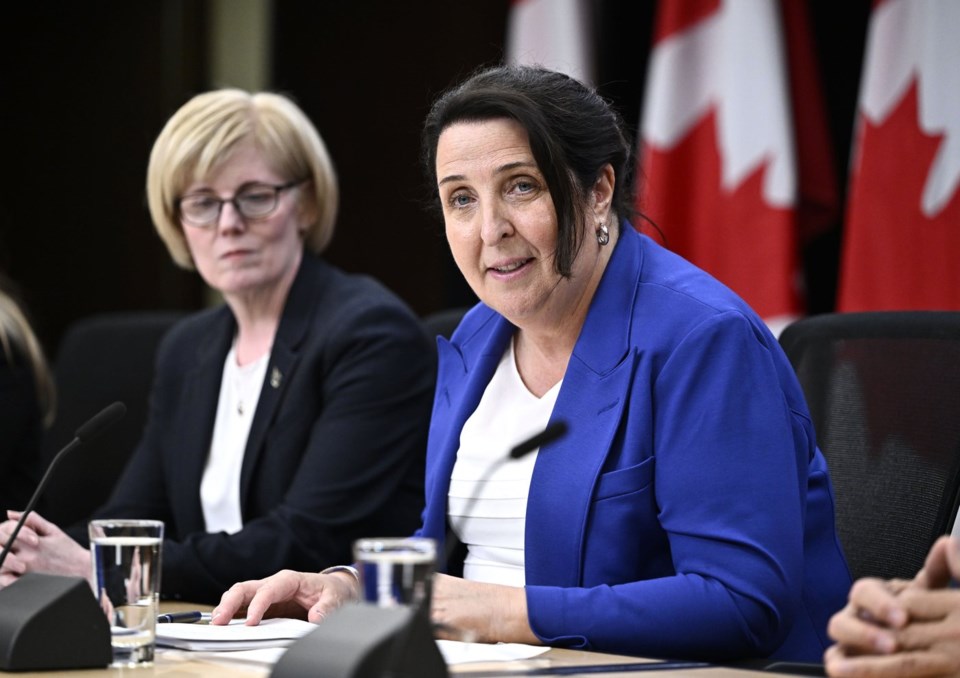CALGARY — The woman at the helm of the Future of Sport in Canada Commission says many Canadians have participated so far and she urges more to speak up.
Lise Maisonneuve, a former chief justice of the Ontario court of justice, is leading consultations across the country in an effort to make sport safer and improve the overall sport system.
The commission reached the halfway mark of its consultations this week in Calgary, with more to come in Halifax, Gatineau, Que., Vancouver and Victoria.
Toronto, Regina, Quebec City, Montreal and Winnipeg were the commission's first five stops.
Maisonneuve declined to provide the number of people who have participated so far.
"I can tell you many, many have," she said Thursday in Calgary. "We still have many to meet. The demands are increasing."
Federal sports minister Carla Qualtrough announced the commission in December 2023 despite pressure from several quarters for a national inquiry.
The commission's job is to produce recommendations to make sport safer and improve the sport system through elements such as culture, policy, funding, governance, reporting and accountability.
People can take an anonymous online survey, write to the commission or speak to Maisonneuve in person.
"It is a commission that is independent of the federal government," Maisonneuve said. "It is a commission that must be trauma-informed pursuant to the terms of reference. We have, I believe, created that safe space.
"We do want to hear from Canadians. We need to hear their voice in order to consider that in the recommendations that we make and we are open to hearing from them. People need to come forward so that we can have all of the necessary information, the necessary views, the diverse views of our Canadian public to make sure that our report addresses the issues that Canadians see in the system.
"We are asking Canadians to come forward and to speak with us."
This year's federal budget provided $10.6 million over two years to the commission.
Qualtrough has compared the sport commission’s work to that of the Truth and Reconciliation Commission, which between 2007 and 2015 investigated harm caused by residential schools, and proposed both solutions to that harm and prevention of further abuse of Indigenous Peoples.
What was originally nine city stops for the commission ending Dec. 13 in Halifax was expanded and rearranged with the addition of Gatineau, Que. The commission concludes in-person consultations Jan. 31.
The commission is required to hold a summit within 14 months of commencing its work in May, which lands that summit in the summer of 2025.
The commission is also required to produce a report both before and after the summit.
"The recommendations will be made to the government, and, of course, they will decide what to do with them, but we are hearing great views from people. We're hearing interesting stories," Maisonneuve said.
"We're hearing suggestions of what can make the system better. We intend on reflecting that in our recommendations."
Tearful athletes told parliamentary committees in 2022 and early 2023 about the physical, mental and sexual abuse they experienced in their sport.
MPs heard that pressure on national sports organizations to produce medals, and get funding to do that, contributed to toxic environments in which athlete welfare took a back seat.
Both Qualtrough and her predecessor Pascale St-Onge called the situation a crisis.
"Athletes are coming forward," Maisonneuve said. "Athletes are participating, and so are many organizations. So are other Canadians that are either in or out of the sports system."
The Coaches Association of Ontario's 2024 report released Thursday stated four in 10 coaches didn't know what values make up a positive sport culture and one in three were not coaching in ways that reflect those values.
"I haven't had a chance to review the report," Maisonneuve said. "We are taking into consideration numerous past reports.
"We are also accepting submissions from people who wish to share any reports that they may have authored, or from academics and so on. All of this could be part of the database that we will consider in making our recommendations."
This report by The Canadian Press was first published Nov. 28, 2024.
Donna Spencer, The Canadian Press




